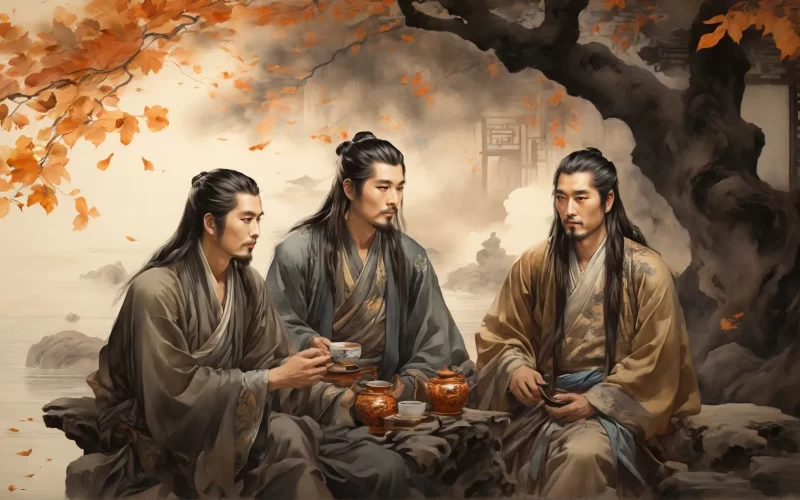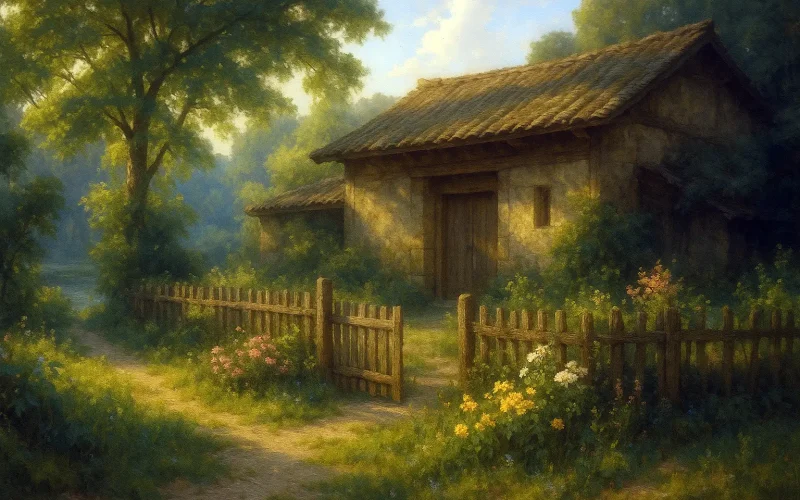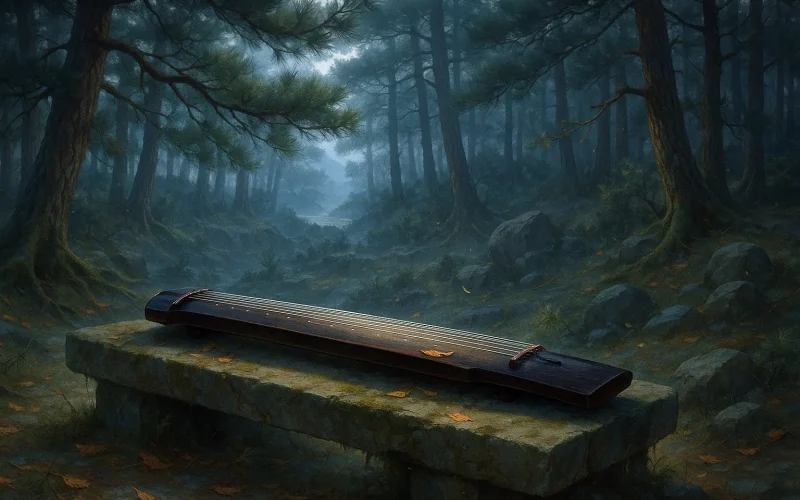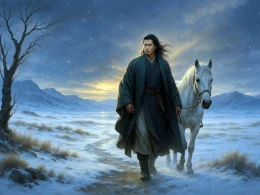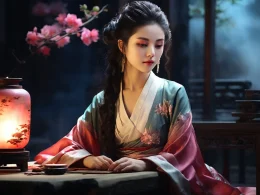Dare I, at my age, accept my summons,
Knowing of the world's ways only wine and song?...
Over the moon-edged river come wildgeese from the Tartars;
And the thinner the leaves along the Huai, the wider the southern mountains...
I ought to be glad to take my old bones back to the capital,
But what am I good for in that world, with my few white hairs?...
As bent and decrepit as you are, I am ashamed to thank you,
When you caution me that I may encounter thunderbolts.
Original Poem
「江州重别薛六柳八二员外」
刘长卿
生涯岂料承优诏,世事空知学醉歌。
江上月明胡雁过,淮南木落楚山多。
寄身且喜沧洲近,顾影无如白发何!
今日龙钟人共老,愧君犹遣慎风波。
Interpretation
Composed around 766 AD, this poem was written by Liu Zhangqing during his transfer from Panzhou to Muzhou prefectures, as a farewell to friends Xue Liu and Liu Ba while passing through Jiujiang. Though still bearing the stigma of demotion, the relocation from the barbarous southern frontier of Panzhou to the relatively prosperous coastal Muzhou offered some consolation. In this complex emotional state - mingling bitterness with relief - Liu crafted this work expressing both worldly reflections and profound gratitude toward his friends.
First Couplet: "生涯岂料承优诏,世事空知学醉歌。"
Shēngyá qǐ liào chéng yōu zhào, shìshì kōng zhī xué zuì gē.
Who'd expect my vagrant life to receive imperial grace? / Worldly matters teach only drunken songs to embrace
The opening couplet employs bitter irony - "imperial grace" (优诏) referring sarcastically to his continued exile. Having weathered political storms, the poet adopts drunken singing as philosophical refuge, revealing his disillusionment with officialdom's unpredictability.
Second Couplet: "江上月明胡雁过,淮南木落楚山多。"
Jiāng shàng yuè míng hú yàn guò, Huáinán mù luò Chǔ shān duō.
Moonlit river sees northern geese in flight / Huai's south - bare trees, Chu's mountains in sight
Transitioning to autumnal scenery along the Yangtze, traditional farewell imagery (migrating geese, moonlit waters) merges with southern landscapes. The "northern geese" (胡雁) symbolize both seasonal change and the poet's own displaced status, while denuded trees and layered mountains mirror his accumulated sorrows.
Third Couplet: "寄身且喜沧洲近,顾影无如白发何!"
Jìshēn qiě xǐ cāngzhōu jìn, gù yǐng wúrú báifà hé!
Exiled yet glad near seashore to dwell / But seeing white-haired reflection - ah, what can one tell!
The emotional pivot finds modest comfort in Muzhou's coastal setting ("seashore" 沧洲 representing marginal but tolerable existence). This tentative relief collapses before the mirror's cruel revelation - aging as the ultimate, inescapable exile. The exclamatory "ah" (何) crystallizes helpless resignation.
Fourth Couplet: "今日龙钟人共老,愧君犹遣慎风波。"
Jīnrì lóngzhōng rén gòng lǎo, kuì jūn yóu qiǎn shèn fēngbō.
Now doddering, we share life's late stage / Shame-faced at your warnings to navigate rage
Concluding with friends' earnest cautions about political storms, the poet's self-description as "doddering" (龙钟) combines physical decline with world-weariness. The "shame" (愧) reflects moved humility - that despite his fallen state, friends still care enough to advise caution.
Holistic Appreciation
The poem traces an emotional arc from ironic bitterness (I), through melancholy observation (II), toward tempered acceptance (III), culminating in grateful humility (IV). Liu Zhangqing avoids either wallowing in misery or false optimism, instead achieving clear-eyed equilibrium. His relocation's modest advantages ("seashore near") are acknowledged without denying life's erosions (white hair, failing body). The final turn to friendship's warmth provides ballast against existential despair.
Artistic Merits
- Layered Irony: Surface gratitude ("imperial grace") masks deep political disillusionment
- Seasonal Symbolism: Autumn imagery (geese, bare trees) externalizes internal exile
- Corporeal Honesty: Unflinching portrayal of aging (white hair, doddering) grounds metaphysical concerns
- Structural Balance: Each couplet completes one emotional movement while propelling the next
Insights
This Tang masterpiece speaks to universal human experiences: reconciling with life's diminished expectations, finding modest comforts amid adversity, and valuing steadfast relationships when status fades. Liu's clear-eyed assessment of his situation - neither denying small mercies nor exaggerating their significance - models emotional maturity relevant to modern readers facing career setbacks or aging. The poem ultimately suggests that true resilience lies not in dramatic reversals of fortune, but in measured appreciation of what remains when grand ambitions fade.
Poem translator
Kiang Kanghu






